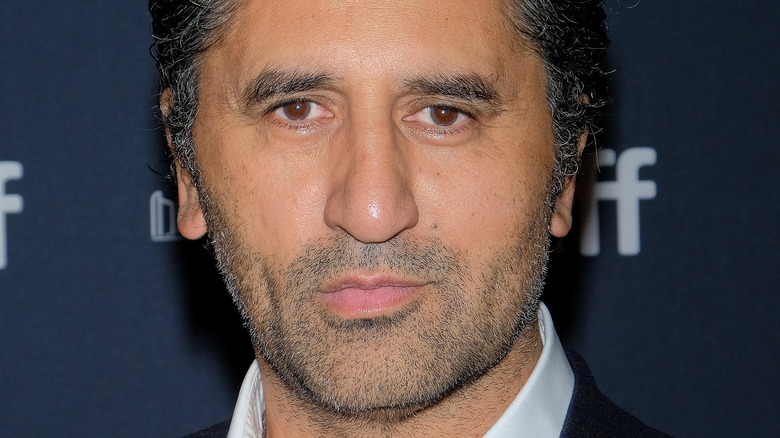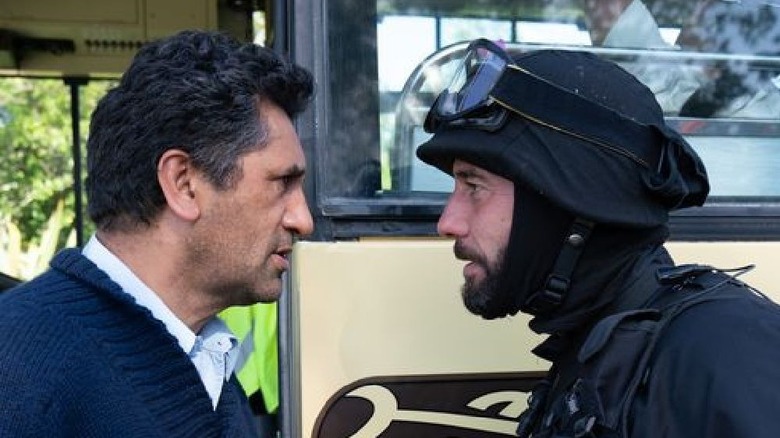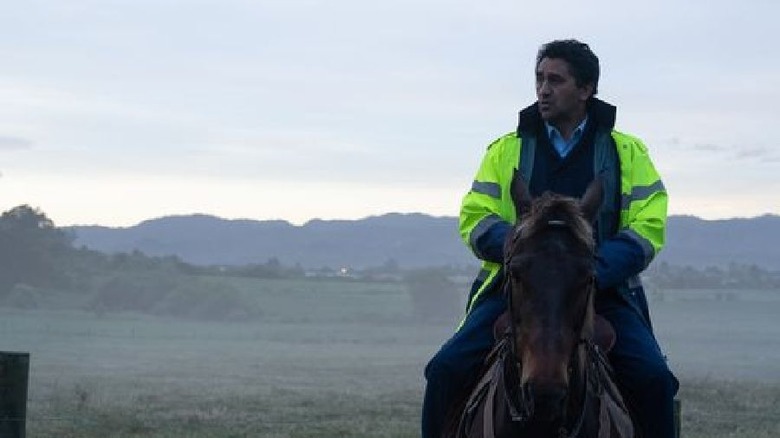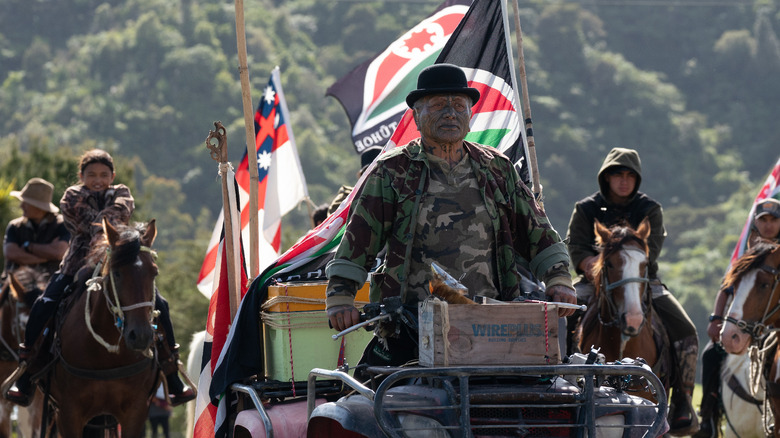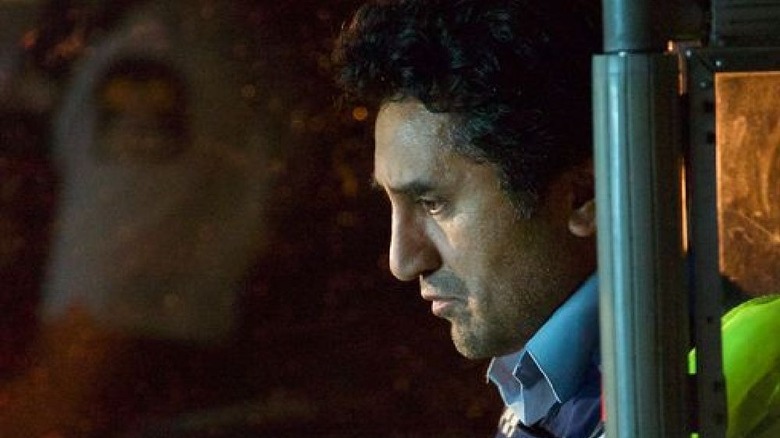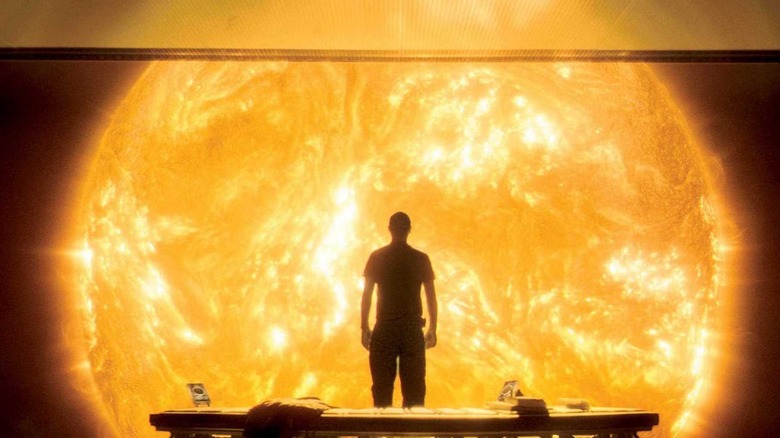New Zealand Actor Cliff Curtis On How His New Film Muru Responds To Real Events - Exclusive Interview
In October 2007, armed police officers conducted a series of raids on a New Zealand community called Ruatoki, home primarily to members of the Indigenous Tūhoe iwi (translated as "tribe" or "nation"). Authorities suspected local activist Tame Iti of running paramilitary training camps to prepare for domestic terror attacks against the government. While 18 people were arrested, including Iti, the charges were eventually dismissed or cleared in court. The incident both embarrassed the government and created deep rifts with the Tūhoe (via Radio New Zealand).
The raids are the inspiration for "Muru," a new movie from New Zealand director Tearepa Kahi and starring Cliff Curtis that recently premiered at the Toronto International Film Festival. "Muru" is a fictionalized account of the raids, with Curtis playing a composite character named Police Sergeant "Taffy" Tawharau. In the film, Tawharau is torn between his loyalty to his community and his job when he gets advance word of the raid. Tame Iti, a producer on the film, portrays himself as well.
As for Cliff Curtis, he's appeared in signature New Zealand films like "The Piano" and "Once Were Warriors," while also playing everything from Jesus Christ (2016's "Risen") to the former teacher Travis on "Fear the Walking Dead." He'll portray a Na'vi this December in James Cameron's "Avatar: The Way of Water" and is scheduled to reprise his role in three more planned sequels.
With a foot in both the New Zealand and Hollywood film industries, Curtis told Looper while in Toronto for the premiere of "Muru" that he sees himself as a bridge between both communities. "That's part of the fun of what I do," he said. "I'm very happy ... to be telling stories that matter to my people, our people, to humanity."
The true story behind Muru that rocked New Zealand
For people who don't know about these incidents, why does this story hit home in particular for you and for the Māori people?
It's based on true events, a troubled relationship between government and the Tūhoe nation. It was a very specific tribal area, and it was about an hour away from where I live. They made a mistake. They got it wrong. They profiled an individual, Tame Iti, and this group of people as domestic terrorists. It was a horrible mistake. But it wasn't just about that one day. That same thing happened nearly 100 years before in 1916, amidst a flu pandemic, actually.
For me, the movie is about working with [director] Tearepa Kahi — who I have a longstanding relationship with as a collaborator — and his wife, Reikura Kahi, [and] wanting to tell stories of consequence, stories that matter, stories that can perhaps hope to examine who we are as a community, as a nation, as a people. In this instance, [it's] trying to access some means of healing. The first part of healing is being honest about who we are.
We got some problems. We got some issues. We got to figure this stuff out, because we don't want this to happen again, do we?
I imagine people in the film world and in pop culture think of New Zealand, and they think, "Oh, 'The Lord of the Rings'" and this beautiful country — which it is, but they don't see that it's a country that's got its issues like every other nation.
Every other country, like every other people. It's not unique to us. But we do have our own unique experience of it even though it's not unique to us.
Why Muru isn't meant as a true account of the Tūhoe raids
The movie says in the beginning that it's not a recreation of, but a response to, the raids in 2007. Why is it important to make that distinction?
This is really important. Again, I've got to throw the credit towards Tearepa Kahi. He's got a solid sort of intellect ... He was clear. He's like, "There's been documentaries made. There's been lots of exposés on events of the time. I don't want to make a documentary. I want to make a movie. I want to make things cinematic. I don't want to be contained by the facts of that single day. I want to fictionalize and I want to have the freedoms of the creator. I've got to squeeze a lot of story into 100 minutes and I can't stick to what happened on that one day, and I want to honor what happened in 1916."
I was like, "Okay, cool. What is the story?" ... He said, "Well, I want action. I want the action there so that people, when they come to the movie, they're actually coming to see a movie that is a cinematic experience."
He very, very astutely identified, like, "If I'm doing a recreation, I'm bound to that one day and the facts of that one day. If I'm doing a response to police brutality and a system that has failed this Indigenous culture, then I have the freedom to fictionalize things in a way that can find a truth in poetry which cannot be found in fact." That's all Tearepa Kahi. He came up with that disclaimer, in a way, that's at the front of the movie. "This is not a recreation of the events of one day. This is a response to a failing system." We have an aspiration that this failing within our community, within our nation, will not be repeated. It's been repeated already. Let's not go there again, please.
Why an important character in Muru plays himself
Tame Iti plays himself. He's the guy they were going after in real life. What was behind the choice to have Tame play himself in the movie?
He's such an iconic, unique, and special individual human being. I met him some 15 years before the events of the riots. He was a restaurateur; he was a DJ at a local radio station. He was doing dance collaborations, painting, sculptures, [and] activist-coordinated theatrical events. I was like, "Wow. Okay." Even his own visage, his own face and the way he presents himself, the way he dresses, the hats he wears — a lot of the stuff that he's wearing in the movie, that's all his own. He is that theatrical in life. You try and tell me who you're going to find to play that guy. Other than him, there was no choice.
Is Taffy, your character, based on a real person, or is he an amalgamation?
I spoke to the community officer who lived in the valley at the time of the raids and had no idea what was going on, which puts him in a very precarious situation in relationship to the people that he's serving in his community, because he's a lone cop, there alone, him and his wife and kids in a house in the middle of the valley. They're going, "What's going on?" He didn't know. He honest to God didn't know. He found out at 5:00 a.m. It was called in. He found out in the middle of the night, and then it happened. It's based on the actual relationship that the police had with the police officers, [that] the institution had with that individual.
I spoke to other police officers from the region that had served in that area, too, to get a sense of how they functioned. How do you arrest a family member? How do you do that? It functions by consent, because a police officer in that community has to have the consent of the elders. That's actually how it functions. That's how it works. You have to have the respect and the consent of the community, of the families of that valley, in order to be able to function as a police officer — otherwise, you'd be done for.
Going from Muru to Avatar: The Way of Water
You've been in some of huge Hollywood movies, and you also work consistently in your home industry. Do you try and bridge the two? Do you see yourself as an ambassador between Hollywood and the New Zealand film community?
Absolutely. 100%. That's part of the fun of what I do. I'm playing a man in blue, a police officer in my own community in Māori. But completely unrelated to that, in "Avatar 2," which is coming out in December, I'm a blue person in a franchise of "Avatar" sequels, the great Jim Cameron's opus masterpiece. Thematically, what's interesting is they're both about family and they're both about Indigeneity and the response to an uncaring system [that] is not respecting the rights of the Indigenous people. It's really interesting. I'm very proud of that. I'm very happy to be a part of both of these magnificent films and to be telling stories that matter to my people, our people, to humanity.
What's the experience been like working with Cameron? Do you think he's changing the game again with these next couple of "Avatar" movies?
I hate to paraphrase them and get it wrong, but I'm going to try and paraphrase something that I heard him and ["Avatar" producer] Jon Landau say. It's something like this, so don't quote me — it's paraphrasing. It's something like, "We're not game-changing. We're evolving the game. This is the evolution of what we do." I was like, "Oh, wow"... [It's] something like that. Boy, the evolution is game-changing as far as I'm concerned. It's amazing. It's incredible.
Is this the most work you've ever done in terms of motion capture?
100%.
How does that change the way you act when you're performing as a Na'vi?
Good acting, craft, technique, all comes down to finding something that rings true and honest. The more layers of technicality you put on it, the more crucial it is. You can't hide behind any of that stuff. If there's no core of something, an essence of seeking honesty and truth in what you're doing in your work, then all the tricks in the book aren't going to ... They're going to expose it. They're not going to cover it up, actually.
Two other Cliff Curtis films you should catch
What's a film of yours that you would like people to maybe rediscover? I told my wife I was interviewing you, and the first word that popped out of her mouth was "Sunshine."
Oh, wow. [Director] Danny Boyle — great example. It's funny you mention your wife; it's because of that movie that I met my wife. I was doing post-production and I'd been working in London for five months, and it wasn't until I did the post-production that I went to the opening night of "The Last King of Scotland." I met my wife there because of "Sunshine." Rediscover that movie.
The last time I was in Toronto, though, was for "The Dark Horse," while I was playing the role of Jesus in Spain. I just flew in from Spain right now. It's funny how things happen. I flew into Toronto a day ago to come and do this for our movie that's here. Last time I flew in Toronto, it was for the last New Zealand film that I had here, called "The Dark Horse," while I was filming in Spain playing Jesus. Rediscover "The Dark Horse," which is another movie I'm very proud of from home.
"Muru" premiered at the Toronto International Film Festival, while "Avatar: The Way of Water" opens on December 16, 2022.
This interview was edited for clarity.
